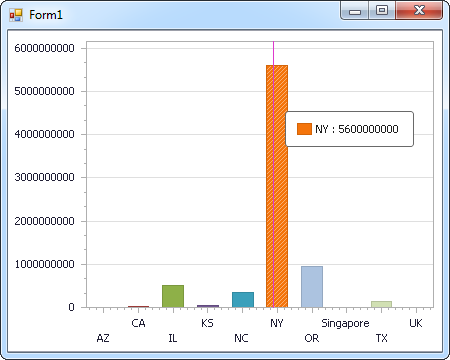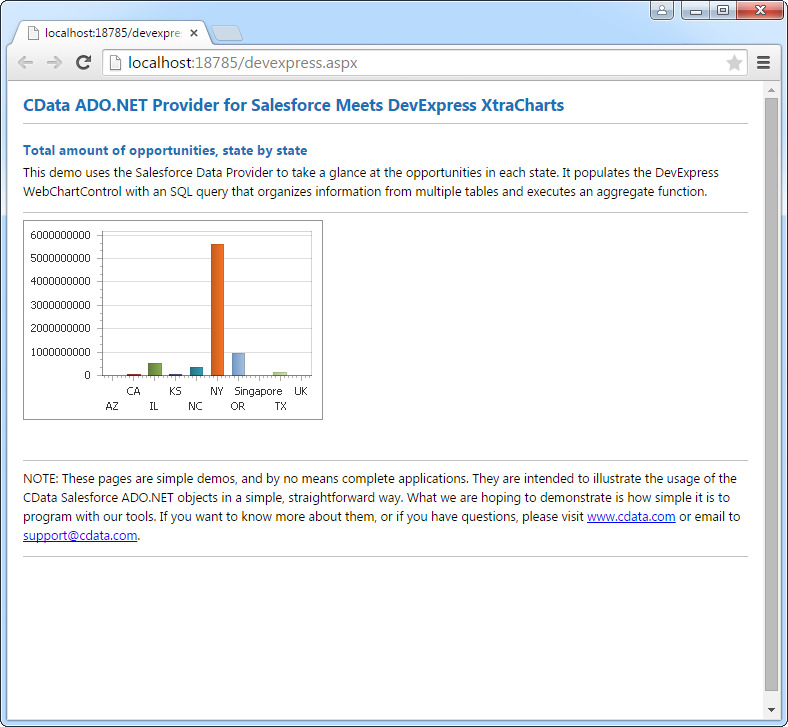Discover how a bimodal integration strategy can address the major data management challenges facing your organization today.
Get the Report →DataBind Unbounce Data to the DevExpress Data Grid
Use the CData ADO.NET Provider for Unbounce with the DevExpress Windows Forms and Web controls to provide Unbounce data to a chart.
The ADO.NET Provider for Unbounce by CData incorporates conventional ADO.NET data access components compatible with third-party controls. You can adhere to the standard ADO.NET data binding procedures to establish two-way access to real-time data through UI controls. This article will demonstrate the utilization of CData components for data binding with DevExpress UI Controls (Windows Forms and Web controls), specifically binding to a chart that visualizes live data.
Start by setting the Profile connection property to the location of the Unbounce Profile on disk (e.g. C:\profiles\Unbounce.apip). Next, set the ProfileSettings connection property to the connection string for Unbounce (see below).
Unbounce API Profile Settings
Unbounce uses OAuth to authenticate to your data.
In order to authenticate to Unbounce, you will first need to register an OAuth application. To do so, go to https://developer.unbounce.com/getting_started/ and complete the Register OAuth Application form.
After setting the following connection properties, you are ready to connect:
- AuthScheme: Set this to OAuth.
- InitiateOAuth: Set this to GETANDREFRESH. You can use InitiateOAuth to manage the process to obtain the OAuthAccessToken.
- OAuthClientId: Set this to the Client Id that is specified in your app settings.
- OAuthClientSecret: Set this to Client Secret that is specified in your app settings.
- CallbackURL: Set this to the Redirect URI you specified in your app settings.
Windows Forms Controls
The code below shows how to populate a DevExpress chart with Unbounce data. The APIDataAdapter binds to the Series property of the chart control. The Diagram property of the control defines the x- and y-axes as the column names.
using (APIConnection connection = new APIConnection(
"Profile=C:\profiles\Unbounce.apip;Authscheme=OAuth;OAuthClientId=your_client_id;OAuthClientSecret=your_client_secret;CallbackUrl=your_callback_url;InitiateOAuth=GETANDREFRESH")) {
APIDataAdapter dataAdapter = new APIDataAdapter(
"SELECT Id, Name FROM Tags WHERE State = 'active'", connection);
DataTable table = new DataTable();
dataAdapter.Fill(table);
DevExpress.XtraCharts.Series series = new DevExpress.XtraCharts.Series();
chartControl1.Series.Add(series);
series.DataSource = table;
series.ValueDataMembers.AddRange(new string[] { "Name" });
series.ArgumentScaleType = DevExpress.XtraCharts.ScaleType.Qualitative;
series.ArgumentDataMember = "Id";
series.ValueScaleType = DevExpress.XtraCharts.ScaleType.Numerical;
chartControl1.Legend.Visibility = DevExpress.Utils.DefaultBoolean.False;
((DevExpress.XtraCharts.SideBySideBarSeriesView)series.View).ColorEach = true;
}

Web Controls
The code below shows how to populate a DevExpress Web control with Unbounce data. The APIDataAdapter binds to the Series property of the chart; the Diagram property defines the x- and y-axes as the column names.
using DevExpress.XtraCharts;
using (APIConnection connection = new APIConnection(
"Profile=C:\profiles\Unbounce.apip;Authscheme=OAuth;OAuthClientId=your_client_id;OAuthClientSecret=your_client_secret;CallbackUrl=your_callback_url;InitiateOAuth=GETANDREFRESH"))
{
APIDataAdapter APIDataAdapter1 = new APIDataAdapter("SELECT Id, Name FROM Tags WHERE State = 'active'", connection);
DataTable table = new DataTable();
APIDataAdapter1.Fill(table);
DevExpress.XtraCharts.Series series = new Series("Series1", ViewType.Bar);
WebChartControl1.Series.Add(series);
series.DataSource = table;
series.ValueDataMembers.AddRange(new string[] { "Name" });
series.ArgumentScaleType = ScaleType.Qualitative;
series.ArgumentDataMember = "Id";
series.ValueScaleType = ScaleType.Numerical;
((DevExpress.XtraCharts.SideBySideBarSeriesView)series.View).ColorEach = true;
}







